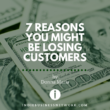Recently, I have met with people who exert great influence on the laws and policies affecting small business owners. My visits to the Small Business Administration, the FDA, Capitol Hill and to Democratic National Headquarters is part of the continuous process of representing my IBN members in efforts to secure our freedom to launch, own and manage profitable businesses. (Read more about why this is important here.)

As I move through this journey, I receive more emails and phone calls from people seeking to start businesses, and lamenting that the economy is killing and/or the federal government is killing their dreams. Sure, the economy is lousy. Sure, the feds could do better. But putting those things aside for a moment, there are things you can do too.
A recent email started out questioning IBN's membership dues, which are $150 per year. After that, the question turned to the l larger issue of the fact that so many things must be purchased before a business starts — things like containers, labels, ingredients and manufacturing equipment. The questioner said he designed his own website to avoid the $1,500 requested by a professional designer. He also said this:
“If this country is to survive we need to create businesses. Is there no way that we can help each other through the initial start up phase? We all know that the federal government is nothing but a giant hindrance to anyone looking to start a small business. They only give trillioins to bankers.”
His specific question was:
How does anyone ever get started with everyone demanding UPFRONT large sums of money, when you have not made a single dime off of your products yet?
I sympathize greatly with this question. I started IBN a decade ago when I was gainfully employed. I used the money from my pay check to launch. I cashed in stock options and a 401K. I had no consumer debt and no student loans.
Back then, a few people were starting to say it was easy to start a business from home in your bunny slippers. These types of messages are far more common today, and I think they have created the impression that achieving success as a small business owner is not only easy, but also inexpensive.
That is a lie.
Small business freedom is not free. You need money to start a business, and you generally need a lot more than you think.
There's Good News!
But there is good news!! No, there is amazing news! It is possible to be successful in business, and this challenging economy may be the best time to kick things off. Before you do, however, you need to be informed and realistic.
-
You Must Plan. When I started my first business in 1995, it was difficult to acquire the information needed to get started. The Internet was in its infancy, and I had neither an Internet connection or a computer. I had money, but I didn't know how to invest it. I had no mentors, and not a single person I knew was trying to start a business at that time.
I had every reason to fail, and fail I did. I didn't know what to do, so even though I had money, I was temporarily stuck — that is, until I realized that a good plan is better than money when you are first starting out.
Today, there is no excuse for being surprised at how much money is needed to start and manage a business. Business planning books are available for pennies online. Blogs and websites make important information available to everyone at no charge. Google puts thousands of years of resources at your fingertips — resources, including my free online podcast. Check out my interview with business planning expert Tim Berry, for example.
In order to know how much money you need, you have to plan. You have to decide what you want to achieve long term, how you are going to get started toward achieving it, and, yes, how much money you will need to get where you want to go. The planning process can be painstaking, but let me assure you — trying to be successful without a plan is absolutely worse.
The good news here is that, by planning, you inform yourself in advance regarding how much money you'll need to launch with maximum chance of success.
-
You Must Have Money. Once you have a plan, and you know how much money you need (double that figure for cushion — you'll need it), the sensible thing to do is to figure out where you're going to get the money before you launch.
There are 4 ways to get money: (1) earn it; (2) borrow it; (3) steal it; or (4) be gifted. Please skip the third option. My favorite is the last one, but if that option is not available to you, then you're down to earning and/or borrowing.
You may find a small business loan through a local bank or you may win a business plan competition. (Google to find some — there are plenty.)
By far the best way to acquire the money you need is to earn it as I did. I saved every penny from my job and cashed in money I had earned in the past (savings, stock options, 401K).
If you discover that you cannot get the money you need at this time in your life, do yourself a favor and table your business idea until you do have the money. Get a job, or get multiple jobs, charging the highest price you can for your time. Use what's necessary to live off of, and save the rest for your business.
Continue to plan and learn during this time because the market will change. Join a trade organization in the industry you want to participate in. Attend a trade show or conference so you can acquire the knowledge you need in advance of when you need it. The discipline you will acquire during this time will give you a leg up on the competition when you finally get started.
Don't do what I see so many do, ignoring the financial warning signs and starting out on a wing and a prayer. Praying is necessary to achieve maximum success (and not for financial reasons), but prayer does not make customers suddenly line up to exchange their hard earned money for your product. You have to earn the right to get their money by studying and planning in advance.
If you don't get the money you know you'll need to be successful, either because you are impatient or simply don't inform yourself, then you cannot blame the economy, the government, IBN member dues or anything else when things don't work out.
-
You Must Be Focused. When I started out in business over a decade ago, you didn't have to be especially good or focused to be successful. Throughout the 1990's, people launched all kinds of businesses, and they made money because the economy was great.
Things are different today. You can't just toss caution to the wind and hope things work out.
And here's an important point. Today, not only do your products have to be good, but Y-O-U have to be good.
You have to be continually focused on fashioning yourself into a better and more capable leader so your business can achieve to its maximum potential under your leadership. You do this by reading, networking with like-minded people, and by applying what you learn. If you do not do this, everyone else who is doing it will get the customers you could have.
Today, a good product does not get you in the game, because too many other people have good products. What gets you in the game today is Y-O-U, and your ability to focus your efforts relentlessly on specific goals. You have to shine a laser light on what you want, and then define your daily activities so clearly that you cannot help but move toward your goals each day.
These steps toward your dream can only be taken one at a time, incrementally, and only after you have planned, and only after you have the money you know you'll need as a result of your planning.
A Harsh Wake-Up Call
I know this sounds harsh to some. I also know that the current economy is a big monkey wrench. But looking around, I see lots of people starting and managing successful businesses, despite the economy. Besides, I prefer to publish the real deal than to see you spend a ton of time and money experimenting, and have nothing left to show for it.
Identify your goals first. A great book to help you do this is The Success Principles by Jack Canfield. You can listen to my radio show interview with him here, then buy the book (affiliate link) and get started.
Once you know what you want, you can begin to plan, and once you plan, you'll know how much money you need. Then you can focus your time, energy and money on executing your plan. Only by doing these things will you achieve.
A Final Note
By the way, lest you think that once a business is ten years old like mine, it's all smooth sailing — let me correct that myth as well. Proportionately speaking, I invest more resources (time and money) in maintaining my business today than I did five years ago. This is because competition is more fierce and people expect more. If existing businesses don't rise to that occasion by changing and growing, they'll eventually die.
I am continually planning, assessing budgetary issues, changing things and striving to improve myself so I can continue to enjoy the freedom of being in business for myself.
Small business freedom is not free. Not for me. Not for anyone. And when I am tempted to blame the economy because my great new product idea turns out to be a dud, I do a post mortem check. Nine times out of ten, the failure can be traced back to my impatience and poor planning, and not to a lousy economy, or to the government, or to the high prices charged by people for the products and services I need to make my new idea a success.
If you are willing to do the focused work, to learn (and apply what you learn), connect with like-minded people (and leave the rest alone), improve yourself (and not seek to blame things on others), there is no limit to the things you can accomplish.
By the way, if this topic interests you, and you'd like to know what others think before leaving your comments here, check out the interesting opinions and ideas other small business owners shared at our FaceBook Page.
Question: If you've been in business for a number of years, what did I leave out? If you are just starting out, what do you think of my commentary here? What other questions do you have?



